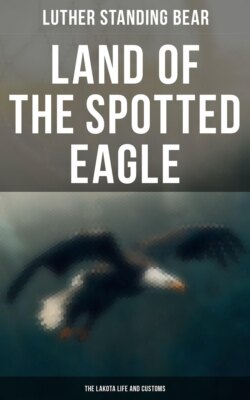Читать книгу Land of the Spotted Eagle: The Lakota Life and Customs - Luther Standing Bear - Страница 7
На сайте Литреса книга снята с продажи.
INTRODUCTION
ОглавлениеTable of Contents
I have often thought it a great pity that our people, the European race, should have burst in upon this land of America and spread ourselves over it as we did in the manner of unsympathetic aliens instead of introducing ourselves as prospective friends, desiring to become fully acquainted with the native features of beauty and of interest in the land, and with the admirable qualities of its people. The native people were able, willing, and ready to be our guides, and to put us at ease in the land which was their home, and to make us feel at home in it also. But we preferred to begin, and to carry on, so far as possible, the removal and destruction of all the belongings of this home and to substitute for them, whether fitting or not, the belongings of our former home in Europe. So we proceeded to destroy instead of adapting and enriching America. We began merely to try to build a New Spain, a New France, a New Netherlands, and a New England. Instead of accepting the good gifts of this new land and people, and adding to them desirable gifts from our own store, thus completely furnishing a really new and handsome home, we spurned them, and our endeavor has resulted in destroying untold native beauty and desirable character, in place of which we have succeeded in establishing a second-hand establishment, furnished out with many of the belongings of the old home to which we were accustomed, but lacking here their proper sense of fitness and independence. We have destroyed and driven out many delightful native birds and in their place have introduced such pests as the starling and the house sparrow. We have changed the landscape, and over extensive areas have destroyed all the native vegetation, and instead of exquisitely beautiful and richly varied native flowers appearing in continually successive waves of color throughout the round of the seasons, both in forest and prairie, we now have burdock, mullein, dandelion, and wild carrot and other boisterous intruders.
Meantime the native people of America could only look on at this devastation in inarticulate and sorrowful amazement. Whereas they had always lived on terms of friendliness and accord with nature, they saw our people ever set themselves in intentional antagonism with set purpose of ‘conquering nature,’ often simply for the sake of conquest.
It is strange that the people of European race coming into possession of this country never did make themselves acquainted with the native people of America. Instead of accepting them simply as one among the human races of the world, endowed with the powers of thought, with emotions and sentiments similarly as are all other races, they have preferred always to view them either in a hazy and spectral light or else in an equally unreal lurid light. Strangely enough, our people have refused to look upon the native people of America as people who had to adjust themselves to their natural environment and to reclaim their necessary food, clothing, and shelter, and to satisfy the demands of their æsthetic nature from among the natural gifts of this land.
Being so constantly misunderstood, the native people of America have been unable to give themselves true expression in the patterns of thought and feeling of the alien race, and hence have been for the most part mute or inarticulate. But now some representatives of the native American race are succeeding in some manner and degree in portraying the thought and feeling and the life of their people to the understanding of the alien race. In this undertaking The Land of the Spotted Eagle does fairly delineate the old native life in such manner as should be grasped with facility by the intelligence and the common human feeling of all persons. If the following paragraph from this book might be extensively and understandingly read by all our people it should go far to correct many false notions:
‘We did not think of the great open plains, the beautiful rolling hills, and winding streams with tangled growth, as “wild.” Only to the white man was nature a “wilderness” and only to him was the land “infested” with “wild” animals and “savage” people. To us it was tame. Earth was bountiful and we were surrounded with the blessings of the Great Mystery. Not until the hairy man from the east came and with brutal frenzy heaped injustices upon us and the families we loved was it “wild” for us. When the very animals of the forest began fleeing from his approach, then it was that for us the “Wild West” began.’
Melvin R. Gilmore
University of Michigan
